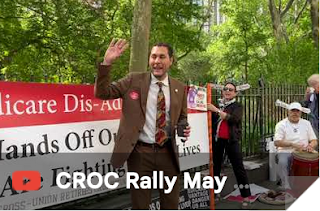BY CHARLOTTE ROBERTSON
Even
as the city proceeds with a shift of its 250,000 municipal retirees to a
private Medicare Advantage plan, scheduled for Sept. 1, former city
workers continue to voice their opposition, if in fewer numbers.
As
they have on occasion since city officials announced the change, dozens
gathered near City Hall Wednesday to once again denounce the effort.
“We
will fight this as long as we have to,” said Sarah Shapiro, a former
city teacher of 28 years and United Federation of Teachers retiree. She
has been protesting the Advantage plan for the past two years.
Shapiro,
sporting a baseball cap inscribed “Adams Screws Retirees,” said she
remained determined. “I’ve been around, and so have these other
retirees. We’ve worked our entire lives for the city,” she said. “We
have been active in our unions our entire lives. We are aware and we are
engaged.”
Following years of litigation, push-back from former municipal workers and a contentious arbitrator's ruling,
Adams administration officials signed the five-plus year contract with
the managed-care company in early April. The administration’s
endorsement followed ratification of the Aetna contract by the Municipal Labor Committee, the umbrella group of city unions, a month earlier.
Both
the de Blasio and Adams administrations have argued that the switch was
necessary given the escalating cost of health care. Officials have said
the switch will save the city about $600 million a year. The savings,
in the form of federal subsidies, will be funneled into the city’s Joint
Health Insurance Premium Stabilization Fund, which finances the unions’
welfare-fund benefits, among other purposes.
Ever
since its conception, though, municipal retirees have fiercely opposed
the Medicare Advantage plan — or “DisAdvantage plan,” as some referred
to it on numerous posters and banners they carried during their rally,
arguing that quality of care offered by the managed-care giant would
pale in comparison to their plans.
‘There are alternate ways’
The
rally took place as the City Council’s Finance Committee conducted
hearings on the executive budget, inviting testimony from residents.
“We
thought we would have our own public hearing outside about our issue,”
said Gloria Brandman, another UFT retiree and founding member of the
Cross-Union Retirees Organizing Committee (CROC). Echoing Shapiro, she
emphasized that retirees had no significant say in regarding a proposed
plan switch.
“There
are alternate ways for the city to save money. It is a small percentage
of the budget, it is very small, what this would save,” she said.
Shapiro
noted that retiree health care will consume less than 1 percent of the
city’s $105 billion budget. “Don’t we matter? After years and years of
dedication to the city?” she asked.
Retirees
argue that the Advantage plan will place limitations on their care.
Brian Wonsever, who worked in the Department of Homelessness Services
for 33 years before retiring, noted that while the vast majority of
doctors accept traditional Medicare, far fewer accept private Medicare
plans.
Opting
out of the Advantage plan and into HIP VIP plan, he continued, would
cost people about at least $6,000 a year. “It’s a matter of choice,” he
said.
But
some have argued that many don’t have that choice, saying they accepted
lower salaries to work for the city in return for the promise of
superior health benefits in retirement.
Without
that, many said they were struggling to envision a healthy future —
with even some current city workers becoming fearful. “I soon plan to
retire and I see that it’s going down the drain,” said Anatoly
Kantorovich, a current employee at the Department of Health and a
self-described retiree-in-training.
Across
the board, the retirees argued that the Advantage plan prioritizes
money over adequate and accessible care. “I’m just going to say it
plain: If you have ever dealt with an insurance company, you know they
are not about efficiency,” Wonsever declared.
Camillo
Biener, who retired from the Human Resources Administration after 26
years with the city, agreed. “It’s a total fallacy, the efficiency
argument,” he said.
“Medicare
Advantage gives less than Medicare. So what happens essentially is that
these companies that run these plans get more money, and they give less
services,” Biener said. “Does that make any sense at all?”
A
faction of UFT members opposed to the switch — which was supported by
the union’s president, Michael Mulgrew — has since begun petitioning for
a vote regarding any future proposed changes to health-care plans. “Our
union never asked us if we wanted to change our health plan,” Brandman
summarized.
The retirees read dozens of testimonies from those who could not attend the rally, some because of health issues.
Shortly
before 11 a.m., the retirees headed from City Hall Park toward where
Mayor Eric Adams was dedicating new public space under the Brooklyn
Bridge. Biener followed, walking his dog, who wore a sign reading, “If
my daddy dies because he had to wait too long for pre-approval, who will
take care of me?”
As
he walked to the bridge, Beiner told The Chief, “My suggestion to all
the media and everybody is to follow the money. … I wish somebody would
look into this stuff, because this thing is a lot deeper, and a lot more
troubling, than what people think.”
Shapiro,
while frustrated and angry, retained some optimism. “We want to remind
everybody that retirees vote,” she said. “We cannot risk the demise of
public Medicare when these ‘Medicare disadvantage’ plans are taking over
the market.”













